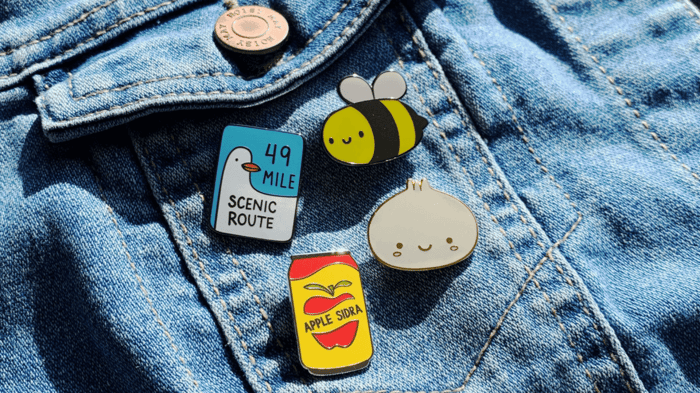Custom enamel pins are a popular choice for businesses, organizations, and individuals looking to create a unique and eye-catching product. However, not all enamel pins are created equal, and the price of custom pins can vary greatly depending on the type of enamel used.
What are Hard Enamel Pins and Soft Enamel Pins?
Hard enamel pins and soft enamel pins are the two most common types of custom enamel pins.
Hard enamel pins are made by filling a metal die-struck pin with hard, durable, and smooth enamel. The enamel is then baked to create a glossy and smooth finish. Hard enamel pins are known for their durability and high-quality appearance.
Soft enamel pins, on the other hand, are made by filling a metal die-struck pin with a softer and more pliable enamel. The enamel is then baked and polished to create a slightly raised surface that gives the pin a more textured look. Soft enamel pins are a more affordable option and are popular for their versatility and affordability.
Why Hard Enamel Pins Cost More
Manufacturing Process
The manufacturing process for hard enamel pins is more complex and time-consuming than the process for soft enamel pins.
Hard enamel pins require multiple steps, including die-striking, enamel filling, baking, and polishing, which add to the cost of production. Additionally, the baking process for hard enamel pins must be precise in order to produce a high-quality result.
Durability
Hard enamel pins are known for their durability and longevity. This makes them a popular choice for organizations and businesses that want to create long-lasting products. However, the increased durability also means that hard enamel pins are more expensive than soft enamel pins.
Appearance
Hard enamel pins have a high-quality and glossy appearance that is appealing to many customers. The smooth and even enamel surface is less prone to chipping or fading than soft enamel pins, which can make them a better investment in the long run.
Why You Might Choose Soft Enamel Pins
Affordability
Soft enamel pins are significantly more affordable than hard enamel pins, making them a great option for individuals or organizations on a tight budget.
Versatility
Soft enamel pins have a slightly raised surface that can be textured and colored in a variety of ways. This makes them a versatile option for creating unique and eye-catching designs.
Ease of Production
The manufacturing process for soft enamel pins is faster and less complex than the process for hard enamel pins, which makes them a popular choice for customers who need their pins in a hurry.
Hard enamel pins and soft enamel pins both have their advantages and disadvantages.
Hard enamel pins are known for their durability and high-quality appearance but are more expensive than soft enamel pins.
Soft enamel pins are more affordable and versatile, but are less durable and may not last as long as hard enamel pins.
When choosing between hard and soft enamel pins, it's important to consider your budget, the intended use of the pins, and the overall look and feels you want to achieve.





